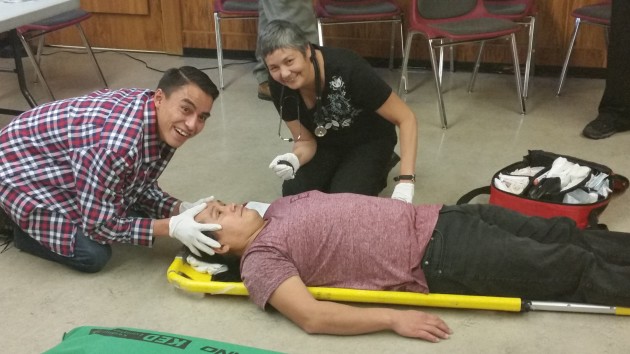First Nations Learn to be First Responders
Program grads Mason Abou holds ‘patient’ Francis West steady, while Bernadine Paul checks the ‘patient’s’ blood pressure – photo 250News
Prince George, B.C. – Today is graduation day for 24 students from First Nations throughout BC as they complete their special First Aid training.
The 24 received advance first aid training as part of program developed by the First Nations Health Authority and the Canadian Red Cross. The program is designed to provide local and community leaders in remote and rural communities, the skills and tools they need to respond to illness or injuries while they wait for ambulance personnel to arrive on scene.
“When we look at the work that has taken place provincially, to date we have had 94 candidates go through with 34 communities having participated” says Becky Row, the Red Cross’ Manager for Northern and Aboriginal Engagement for BC and Yukon .
Today’s graduation class represent 9 different communities says Row including the Lheidli T’enneh, Kwadacha, Takla, Nazko and Ft. Babine.
“The program was born in British Columbia through the leadership of First Nation’s B.C. Back in as early as 2005, they identified a real need for there to be greater responders in rural and remote communities, partly because of the very long wait times because of the remoteness of some communities.”
She says there have already been success stories “With all of the graduates that we’ve had, we’ve heard many stories that have come back to us about a variety of incidents that have been successful.”
The candidates go through more than 40 hours of advanced first aid training “They are learning very advanced skills” says Row “I think one of the things that is really important with this work is not only are they doing the First Aid skills, when they go home, First Nations Health Authority is also supporting them in provision of equipment as well as things like co-incident stress support. So when the candidates arrive home they will have the knowledge, the tools and skills to be successful.”


Comments
A good news story. They are sure to be of assistance to the nurses already on duty on reserves. They are also likely to be fairly busy.
metalman.
Wish them all well, good to hear.
First aid skills aren’t that rare in First Nations communities. I have several friends with their Level 3, useful in the logging industry, and two ambulance attendants.
Comments for this article are closed.